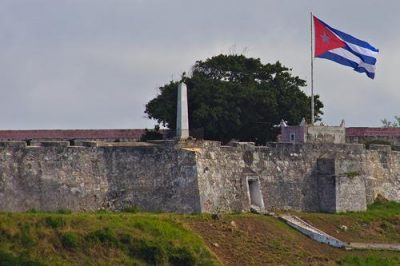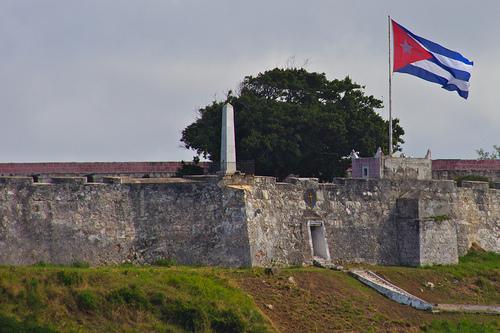In 2012, the White House will focus on the most important of international and national issues: the re-election of the President. U.S.-Cuba policy will fall into “Next Year’s” box – or the year after that. The National Security staff reverts to its familiar positions on relations with that troublesome island: ignorance and arrogance.
Few Americans even in the Foreign Service know the Cuban revolution began in the 1860s as a war of independence against Spain.

A Cuban flag flies over Havana Harbor. Photo by Ed Yourdon.
In January 1959, after almost 100 years of on-and-off combat, the 26th of July guerrillas marched into Havana as winners of the decisive round. The revolutionaries carried another ancestral platform: social justice and equality.
Cubans knew well how Washington had acted as their destiny blocker. By 1898, Cuban “independentistas” had almost defeated Spain. The United States intervened to thwart that goal. Washington imposed the Platt Amendment on Cuba’s constitution, giving itself the right to intervene in Cuban affairs, and a naval base in Guantanamo – now a prison and torture chamber. The United States intruded several times in the 20th Century to alter the island’s fate, including in events following the 1933 overthrow of the Machado dictatorship: to prevent revolutionaries from acquiring sovereignty.
That political-military exercise led to the Fulgencio Batista era (1934-1958) – in which the new U.S.-trained and bonded military held sway.
In 1958, however, Washington lost confidence in Batista’s ability to stop social revolution, and began plotting unsuccessfully with a clique of high military officials to replace Batista with a junta – a la 1934.
The revolutionaries’ victory in 1959 changed Cuba’s destiny. In 1960, after consolidating power, they made “Patria o Muerte” (homeland or death) the national slogan, referring to the long-sought goal. 1930s revolutionaries joined the 1950s rebels in a unity program: build a proud, healthy and literate nation, bound by ideals of social justice, equality and sovereignty.
Cubans were offered the chance to become actors on the stage of their own history. Millions left their homes to teach literacy, or joined militias, and voluntary associations to transform the island from dependency and underdevelopment into healthy development.
Cuba’s revolutionary tradition assumed that a sovereign nation would use its resources to benefit its people. Rich soil and industrious workers would provide everyone with a decent living standard. Poverty, most assumed, derived from foreign or domestic exploitation.
Early laws restricting landlords and large foreign and Cuban property owners allowed the government to distribute resources and services to the population, which won more legitimacy for the revolutionaries. But Cuba’s accumulated wealth would prove superficial compared to its needs.
Over the first decades, children of illiterate Cubans earned PhDs, and became doctors and soldiers who volunteered to go abroad to help change destiny in Africa and Latin America. Others volunteered for arduous tasks of construction and agriculture. By the mid-1970s Cuba had become literate and healthy.
To accomplish the overwhelming tasks of development revolutionary leaders had accepted Soviet help. This uneasy, but convenient marriage from 1972-1985 included adopting the Soviet economic and administrative models.
For Cuba the deal meant soft loans, technical assistance, secure supply lines and a high-paying market for its products. While most Third World countries transferred capital to developed countries, the Cuba-Soviet agreement reversed the pattern, permitting the island to have sovereignty, social justice and relative equality. Cubans also became world-renowned artists, writers and athletes.
For the Soviets, Cuba became a legitimizing instrument to maintain credibility among third world peoples, playing a broker-like role for Soviet positions at third world meetings.
On July 26, 1989, however, Fidel Castro warned of the impending demise of the Soviet bloc. Cubans had to prepare. The enemy 90 miles away loomed as a constant threat to the revolution’s goals.
In 1991, the Soviet Union died. Without Soviet aid and trade, could Cuba’s economy survive? The unthinkable alternative, surrender to Washington, led Cuban leaders to design the “special period” – a daily juggling for survival. Euphoria prevailed in Washington. Scholars announced “the end of history,” capitalism had won – well, if one ignored the cyclical disasters. Computers and the Internet would remake the world. China and Vietnam had already abandoned communism – in all but name. Cuba remained the “Jurassic state.”
Without even major trade partners, Cuba’s leaders at first relied on abstractions: national honor, patriotism and shared sacrifice, hardly adequate weapons to fight a 32 percent decline in GDP in one year.
Circumstances dictated that Cuba earn money from foreign tourists, who required a service oriented labor force – including prostitution. Cuba permitted remittances, which created inequality. Working Cubans earned less than non-workers who got rewarded by family members abroad.
Cuba began earning dollars for doctors’ and educators’ services abroad. In turn, this reduced the breadth and quality of education and health care at home.
Living standards fell. Theft, black markets and corruption tied to bureaucracy grew. Those too young to experience the days of subsidized consumption became pessimistic – even cynical – and desperate about their future. Complaining reached theatrical height. As leaders repeated old slogans teenagers passing below signs of Che Guevara reading “Como el Che,” would often say “Sí, asmático.” (Like Che … yes, asthmatic.) Some opted for rafts to Florida.
Meanwhile, the revolutionaries maintained political power and withstood two decades of counter revolutionary efforts from abroad. By 2001, Cuba’s economy and administrative structures had begun to fall into dysfunction. Corruption levels became intolerable; the once exciting revolutionary script sounded trite.
When Hugo Chavez became president of Venezuela, he provided Cuba with aid and political alliances. Additionally, Latin America accepted Havana as a full partner, ending Cuba’s isolation
Recently, Cuba’s Communist Party reviewed the economy. A new script began to emerge as a series of guidelines (lineamientos). Changes have begun to affect property rights, domestic trade, employment practices, and investments.
In 2012, Cuban leaders could forge a new mission, to remake Cubans as the inspiration – if not saviors – of human life on the planet. Part of Cuba’s population still vibrates with desires to act on the world stage with a script the world’s people need.
Imagine Cuba leading a green revolution for survival! They have the science, experience and organization. Will the leadership pass the torch to those who have the energy and will to carry it out?
Next week: how Fidel Castro laid the groundwork for an environmental mission.
